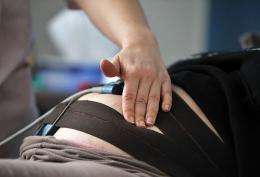British health tech startups seek US foothold

British entrepreneurs touting new technologies for concerns such as keeping tabs on addled elderly or trouble getting pregnant were courting Silicon Valley connections on Wednesday.
Nineteen promising startups were here to connect with investors, technology titans, and potential partners as part of a Future Health Mission backed by the British Technology Strategy Board.
"We brought the best and the brightest companies that we think are on the bottom of the growth hockey stick to the San Francisco Bay Area," said the board's Zahid Latif.
"Where else would you bring them but one of the most innovative areas on the planet?"
The contingent's week-long stay was timed to coincide with an annual JP Morgan health conference and includes meetings with chip maker Qualcomm, computer giant Hewlett-Packard, and networking powerhouse Cisco.
"It's been fantastic," said Shamus Husheer, whose startup Cambridge Temperature Concepts is part of the group. "Getting these introductions at a very high level to the right people is amazing."
Husheer's DuoFertility invention that uses body temperature feedback to predict prime times for a woman to get pregnant has proven itself in Europe and his company is heading for the US market.
A woman wears a patch about the size of a US 25-cent piece under one arm, and information from sensors is analyzed to determine when she is most fertile. Results are routed wirelessly to a handset.
The information can also be sent over the Internet to doctors so they can try to pinpoint conditions that may be preventing people from conceiving.
DuoFertility pays back the 495-pound price of the kit if a woman doesn't get pregnant as promised within a year.
"My parents had one hell of a time bringing myself and my brother into the world," the scientist said of his inspiration for the invention.
"I came up with the concept while working on my PHD and immediately knew which application to put it to."
He founded the company while working on a graduate degree in chemistry at Cambridge University.
DuoFertility is seeking approval from US regulators and hoped to be in the United States by the end of the year. The company is already having trouble keeping up with demand in Europe.
"We are actually having problems maintaining stock," Husheer said. "Which is wonderful, but still a business problem."
About 80 health-oriented startups vied to take part in the outing to San Francisco, with 19 of the "best and brightest" being selected, according to Latif.
Startups included the maker of a "buddi" device smaller than a deck of cards that uses global satellite positioning technology to "discreetly" track children or elderly people with dementia.
Buddi gadgets could send alerts to friends or family members when people fall and can't get back up or if they strayed into areas designated as off limits, according to the company.
Neotherix touted technology that speeds the healing of wounds while reducing scarring.
"From what we are seeing of the buzz around these companies, from our perspective it is mission accomplished," Latif said of the mission, which ends on Friday.
(c) 2011 AFP
















